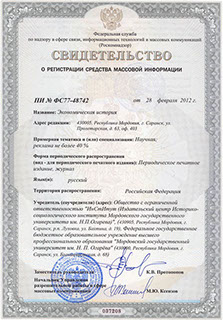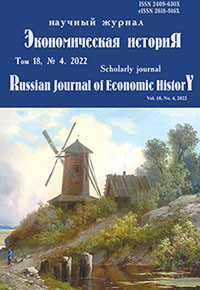Экономическая историЯ
Russian Journal of Economic History
ISSN 2409-630X (Print)
ISSN 2618-916X (Online)
Expert board:
- Scientific Council of RAS on economic history;
- Research and Educational Center «The economic history of Central Russia and the Middle Volga region» of Ogarev Mordovia State University;
- Center of Economic History of Lomonosov Moscow State University
Navigation
Certificate of registration

ISSN 2409-630X (Print), ISSN 2618-916X (Online)
DOI: 10.15507/2409-630X.059.018.202203.330-344
Eugeny N. Efremov1, Timofey D. Nadkin2
1, 2 Mordovian State Pedagogical University named after M. E. Evseviev (Saransk, Russia)
1 e-mail: een.pravo@gmail.com
2 e-mail: ntd2006@yandex.ru
Economic Aspects of the State Policy on the Transfer of Religious Architectural Objects to the Russian Orthodox Church on the Territory of Mordovia in the 1990s
Abstract
Introduction. The return by the state of religious buildings and structures of the Russian Orthodox Church (ROC) confiscated during the Soviet period remains one of the pressing issues of post-Soviet religious revival. The article examines the features of this process on the example of such a region of the traditional spread of Orthodoxy as Mordovia in the 1990s. The purpose of the study is to comprehensively analyze the regional features of the implementation of the state policy on the transfer of religious architectural objects to the ROC in the 1990s on the territory of Mordovia.
Materials and Methods. The materials for writing the article were unpublished documents from various archives (the Central State Archive of the Russian Federation, the Archive of the Saransk Diocese of the Mordovian Metropolia of the Russian Orthodox Church, etc.), as well as published sources presented by appeals to the authorities of Bishop Varsonofy of Saransk and Mordovia. The analysis of sources from these archives required the use of the principle of historicism, the historical-comparative method and the hermeneutic approach.
Results. Ministry of Culture with the Supreme Council of the MSSR, which blocked V. D. Guslyannikov’s decisions concerning the transfer of religious objects to the ROC, which housed cultural institutions and other structures of the national economy. The third stage (April 8, 1993 until September 22, 1995) – the liquidation of the post of President and the continuation of the period of boycott by the political leadership of Mordovia of the implementation of the Decree of the President of the Russian Federation dated April 23, 1993 No. 281-rp “On the transfer of religious organizations of religious buildings and other property”. The fourth stage (from September 22, 1995 to the end of the 1990s) is characterized by the democratization of the state policy of Mordovia on the transfer of religious property to the Saransk and Mordovia diocese. During this period, the new leadership of the Republic of Mordovia, headed by N. I. Merkushkin partially implemented the decree of the State Property Committee of the Russian Federation No. 803-r dated June 13, 1995, on the basis of which in 1995–1999 42 out of 78 religious real estate objects are transferred to the Saransk and Mordovia dioceses. At the same time, in some cases, local authorities continued to delay the return of some monuments of church architecture of the Saransk and Mordovia dioceses, while canceling their own decisions on the transfer of these objects.
Discussion and Conclusion. In the 1990s, about 127 religious real estate objects were returned to 198 Orthodox religious organizations in Mordovia that were active on January 1, 2000. Taking into account the fact that on the territory of the Mordovian Territory before the revolution of 1917 there were 589 structures of the Russian Orthodox Church, about a quarter of which were completely destroyed during the Soviet era, it follows that in the 1990s the process of transferring monuments of religious architecture to the Saransk and Mordovian diocese was not fully completed. The reason for this, of course, was not the full implementation by Mordovia of the all-Russian religious policy, in some cases its complete disregard. However, there were objective reasons for this in the conditions of the socio-economic crisis, which consisted in the lack of free premises where it would be possible to place social infrastructure facilities located in closed religious buildings.
Keywords: confessions, Russian Orthodox Church, Orthodoxy, Mordovian SSR, Republic of Mordovia, Saransk and Mordovia diocese.
For citation: Efremov E. N., Nadkin T. D. Economic Aspects of the State Policy on the Transfer of Religious Architectural Objects to the Russian Orthodox Church on the Territory of Mordovia in the 1990s. Ekonomicheskaya istoriya = Russian Journal of Economic History. 2022; 18(43): 330–344. (In Russ.). DOI: 10.15507/2409-630X.059.018.202204.330-344.
© Ogarev Mordovia State University. History and Sociology Institute, 2017
68, Of. 411, Bolshevistskaya St., 430005, The editorial office of the scholarly journal «Russian Journal of Economic History»
Tel.: (8342) 24-25-90; 27-07-11, Fax: (8342) 24-25-90, E-mail: jurnal-econom-hist@isi.mrsu.ru
Designed by A. Napalkov, Email: napalkov@isi.mrsu.ru

